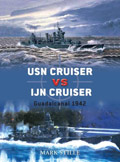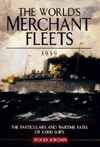The Good Shepherd
Forester, C.S.
1955, Little, Brown and Company, Boston
ISBN 078380363X
310 pages
| Type. | Novel |
| Rating. |  |
This novel follows a U.S. Navy convoy commodore through the course of a North Atlantic convoy bound for Britain, from the journey's beginning to the meeting with a British escort in the Western Approaches.
The author makes rich use of symbolism, much of it Biblical, the most obvious instance being the title of the book, which depicts the escort as shepherd and the convoy as flock. Allusions to lost sheep are made whenever a vessel strays from the convoy. Krause, the commodore, is the son of a Lutheran minister; very religious himself, he repeats snatches of fitting Biblical text frequently. A major irony lies in the fact that both his name and his religion are of German origin, emphasizing the underlying similarities between himself and the men he is fighting and protecting his flock against.
The narrative effectively conveys the atmosphere of constant danger surrounding a convoy, its multi-national character, and the nonstop duties of a convoy commodore and the immense toll of fatigue exacted by the never-ending stream of reports, orders, signals to read and answer, decisions to be made, radar and sonar soundings to be investigated, and crewmen to encourage and keep in line. In another Biblical allusion, the commander can be seen as a Christ-like figure, sacrificing his own well-being for that of the convoy, and contemplating his enemy with sympathy rather than hatred.
The journey itself is symbolic of all convoys, of the vital importance of convoys for the war effort, and of the internal and external forces that conspire to separate the ships and to render them vulnerable to attack. The events of the novel take place over a period of three days, lending it an almost classical unity of action. The attack and feint of the hunter and the hunted are repeated as minute by minute, watch after watch, time and the convoy creep forward.
In addition to telling his tale on a symbolic level, within the confines of the novel the author is successful in describing various technology, weapons, communications, defense maneuvers, and other realities of the U-boat war accurately. He illustrates the difficulty of keeping position in convoy, explains the insufficiencies of sonar and radar, and makes plain the problems of communicating with foreign allies. He effectively captures life on a destroyer in a single image - men called to General Quarters and speeding unhesitatingly to their duty with no knowledge of what they may face.
This is a fast-paced, well-written war novel which can be read on more than one level. For those looking for insight, it is there; those who simply want a good read will enjoy this book as well.
Review written by Tonya Allen.
Published on 1 Dec 2000.
This title is highly recommended.
Return to our main review page.



